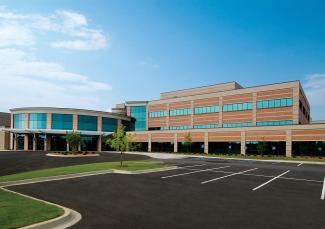What is Chemotherapy?
Chemotherapy (“chemo”) uses drugs to attack cancer cells anywhere in the body. It reliably treats cancers such as:
- Breast cancer
- Colorectal cancer
- Gynecologic cancer
- Head and neck cancer
- Lung cancer
- Prostate cancer
Chemotherapy is one of the most effective cancer treatments. At AnMed Cancer Center, you’ll find the latest chemo services delivered with compassion and expertise. We’re here to ensure you receive excellent chemo care for the best possible cancer outcome.
Chemotherapy (“chemo”) uses drugs to attack cancer cells anywhere in the body. It reliably treats cancers such as:
The type of chemotherapy drug you receive depends on the type and stage of cancer you have along with other factors. Sometimes, chemotherapy is the only cancer treatment needed. More commonly, it is used alongside other treatments. For example, oncologists (cancer doctors) often use chemotherapy to:
Your AnMed team will determine if chemotherapy is appropriate for you and help you understand how it benefits you.
You’ll most likely receive an intravenous (IV) infusion, which allows the drug to rapidly enter the bloodstream and travel throughout the body. Infusions can last a few minutes to a few hours, depending on the type of drug.
Your doctor may recommend a special, small port be implanted in your body to make infusion treatments easier with fewer needle pricks. A port is a small opening with a catheter (thin tube) that is threaded directly into a large vein above the right side of the heart.
Other chemo delivery methods include:
You’ll meet with a medical oncologist (cancer doctor) to discuss when and how often you need chemotherapy. Chemotherapy is often given for three to six months, depending on your stage of cancer. However, you may receive chemotherapy longer to prevent or delay the cancer’s return. This is called maintenance therapy.
Since chemotherapy relies on very powerful drugs, treatment must be paced out in cycles. For example, if your doctor recommends a four-week cycle, you may receive chemotherapy on the first, second and third days of the month. Then, for the next 27 days, you will not receive any drugs. This gives your body’s healthy cells time to recover. The cycle will repeat for as long as needed.
Some cancers need more aggressive treatment with less recovery time between cycles. This is called a dose-dense schedule. Your AnMed cancer care team will determine the appropriate schedule for your cancer type and stage. The team will also monitor the treatment’s effectiveness with CT scans, tumor marker tests, blood tests and other tools.
If chemotherapy doesn’t work well enough, we may recommend other treatment options, such as surgery or radiation.
Chemotherapy targets any fast-growing cells in your body. This includes cancer, but also cells in the skin, hair, digestive tract, reproductive system and bone marrow, which can cause unwanted side effects.
The most common side effects of chemotherapy are:
Your AnMed cancer care team will discuss potential side effects with you and offer ways to relieve them. We can also recommend support services to help manage stress, symptoms, pain and anxiety and promote good health.
You should contact your cancer care team immediately if you experience a fever, chills, bleeding, rash, unusual pain or bloody stool.
You’ll find a warm and comforting environment at the Cancer Center’s third-floor infusion suite, which includes:
Outpatient Infusion is open Monday through Thursday from 8 a.m. to 4 p.m. and Friday from 8 a.m. to 3 p.m.
For more information, call the Cancer Center at 864-512-4675.
2000 East Greensville St., Third Floor
AnMed Cancer Center
Anderson, SC 29621
United States
2000 East Greenville Street
Cancer Center 3rd Floor
Anderson, SC 29621
United States
